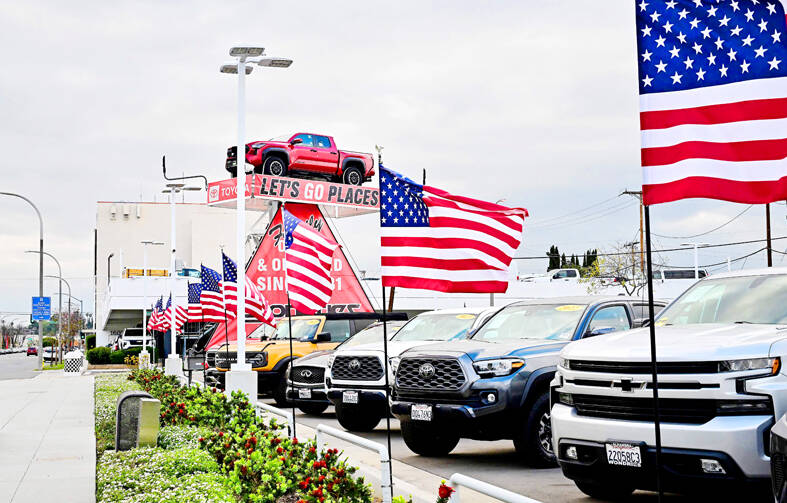US President Donald Trump declared on Saturday that he “couldn’t care less” if automakers increase US car prices in the wake of his imposition of import tariffs.
There have been reports that Trump threatened auto executives with reprisals if prices jump, but he told NBC News that increasing prices would simply help US-based manufacturers.
“I couldn’t care less. I hope they raise their prices, because if they do, people are gonna buy American-made cars. We have plenty,” he told NBC host Kristen Welker.

Photo: AFP
Trump on Thursday imposed a blanket 25 percent import tariff on cars and light trucks made outside the US, due to take effect on Thursday.
Tariffs would be delayed for car parts from countries covered by a US trade pact with Mexico and Canada, as officials try to disentangle the mixed supply chain.
Otherwise, Trump intends for the import levy to be permanent to boost US production and, in his view, save the US auto industry.
That would be particularly painful, because the US auto sector relies on a complex global supply chain, sometimes involving multiple border crossings, with assembly in one country of parts manufactured in others.
The manufacturing process at Ford Motor Co and General Motors Co depends largely on a highly complex back-and-forth between the US, Mexico and Canada — the three countries linked by the US-Mexico-Canada Agreement (USMCA), a free trade agreement signed by Trump during his first term.
However, Trump’s decree does not provide exemptions for imports under the USMCA, dashing industry hopes that car parts would be spared.
The tariffs include “crucial parts” — engines, transmissions, powertrains and electrical components are on the list that could be expanded.
Parts not originally manufactured in the US would face 25 percent tariffs, just like finished foreign vehicles.
The White House said that of the 16 million new vehicles sold in the US last year, half were assembled in the country, but contained only 40 to 50 percent US-made components.
Asked by NBC News what his message would be to worried auto executives, Trump said: “The message is ‘congratulations.’”
“If you make your car in the United States, you’re going to make a lot of money,” he said.
The US president’s goal is to increase manufacturing at home, but relocating factories or reconfiguring a supply chain cannot happen overnight.
Experts have no doubt that there would be a price increase for new vehicles in the US, which would subsequently affect a weakened used-car market, as owners keep their vehicles longer.
The cost of an affected new vehicle could increase by 9 to 12 percent, or US$4,000 to US$5,300, JPMorgan Chase & Co anticipates.

Intel Corp chief executive officer Lip-Bu Tan (陳立武) is expected to meet with Taiwanese suppliers next month in conjunction with the opening of the Computex Taipei trade show, supply chain sources said on Monday. The visit, the first for Tan to Taiwan since assuming his new post last month, would be aimed at enhancing Intel’s ties with suppliers in Taiwan as he attempts to help turn around the struggling US chipmaker, the sources said. Tan is to hold a banquet to celebrate Intel’s 40-year presence in Taiwan before Computex opens on May 20 and invite dozens of Taiwanese suppliers to exchange views

Application-specific integrated circuit designer Faraday Technology Corp (智原) yesterday said that although revenue this quarter would decline 30 percent from last quarter, it retained its full-year forecast of revenue growth of 100 percent. The company attributed the quarterly drop to a slowdown in customers’ production of chips using Faraday’s advanced packaging technology. The company is still confident about its revenue growth this year, given its strong “design-win” — or the projects it won to help customers design their chips, Faraday president Steve Wang (王國雍) told an online earnings conference. “The design-win this year is better than we expected. We believe we will win

Quanta Computer Inc (廣達) chairman Barry Lam (林百里) is expected to share his views about the artificial intelligence (AI) industry’s prospects during his speech at the company’s 37th anniversary ceremony, as AI servers have become a new growth engine for the equipment manufacturing service provider. Lam’s speech is much anticipated, as Quanta has risen as one of the world’s major AI server suppliers. The company reported a 30 percent year-on-year growth in consolidated revenue to NT$1.41 trillion (US$43.35 billion) last year, thanks to fast-growing demand for servers, especially those with AI capabilities. The company told investors in November last year that

Power supply and electronic components maker Delta Electronics Inc (台達電) yesterday said it plans to ship its new 1 megawatt charging systems for electric trucks and buses in the first half of next year at the earliest. The new charging piles, which deliver up to 1 megawatt of charging power, are designed for heavy-duty electric vehicles, and support a maximum current of 1,500 amperes and output of 1,250 volts, Delta said in a news release. “If everything goes smoothly, we could begin shipping those new charging systems as early as in the first half of next year,” a company official said. The new